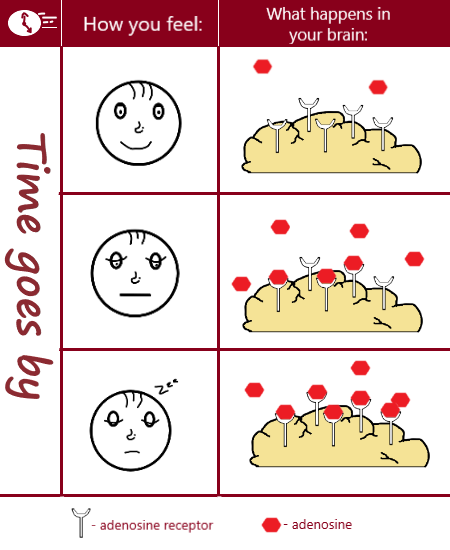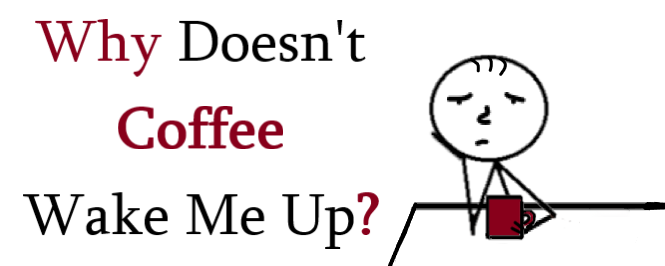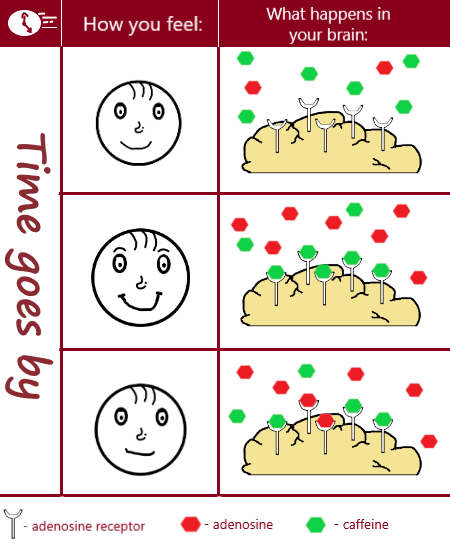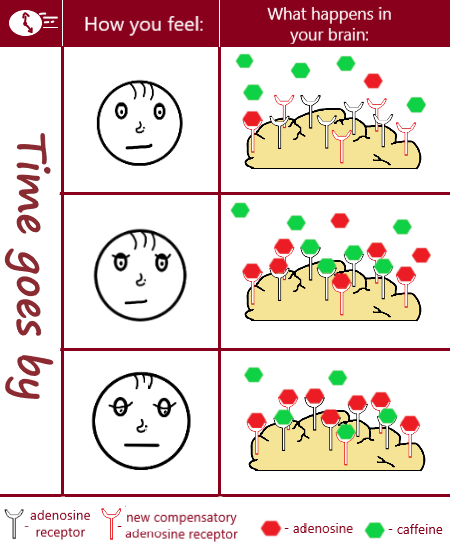Edited: February, 2023
Here’s my story: I start drinking espresso and cappuccino regularly and at some point I realize something strange is happening.
My coffee doesn’t wake me up as before, so I start to wonder why.
It’s the needed substance that gets me through the day, making me well focused at work, while I study, and even when socializing with others.
I start wondering if there is something wrong with me, as after a while not only do I realize caffeine doesn’t really affect me, but my cup of coffee does make me sleepy and even more tired at times.
So I need to make a thorough research on why my coffee doesn’t work on me anymore and if I can make it energize me again.
If you associate with this story, I feel you.
I understand that some people have the same issue, meanwhile others have never even felt the increased alertness, induced by caffeine.
During my research, I found really interesting and useful information that I’ll sum up in this article. You will find out why coffee doesn’t wake you up or fails to keep you awake.
There are some tips and tricks that you may find useful, so let’s get started.
Why Doesn’t Coffee Energize Me?
If you’ve now realized that caffeine doesn’t affect you, it may be temporary, as it didn’t work on me for a while too, but it does now.
There are a few reasons why this may be happening and we will go over them.
So here are the 6 causes of why coffee doesn’t wake you up:
- You’ve built up a caffeine tolerance.
- You are a fast caffeine metabolizer.
- You have your coffee with too much sugar.
- You are dehydrated.
- You are already too tired for it to work.
- You’ve switched the type of coffee you have – different coffee beans/brewing technique.
1. You’ve Built up a Caffeine Tolerance
Probably it’s good to start by explaining what’s the substance in coffee wakes you up and how it works:
Caffeine is the active ingredient of coffee that wakes you up. It acts as an antagonist of adenosine receptors.
When we are awake the levels of adenosine rise each hour and decrease during the sleep recovery period.
Here is an illustration showing how adenosine works:

When we drink coffee the caffeine we’ve ingested binds to the adenosine receptors, as its molecule is structurally similar to adenosine.
By blocking the adenosine neurotransmitters it produces opposite effects, such as the increased wakefulness coffee consumption is related to.
As a result of the adenosine blockage, caffeine also increases dopamine levels, which also contributes to a better focus, sociability, higher energy, and promotes feelings of pleasure.
Here you can see a picture showing how caffeine works:
If you are a regular consumer of caffeinated beverages such as coffee, tea, or energy drinks, in time your body will start manufacturing extra adenosine receptors, since yours are constantly clogged by the caffeine.
This means that you’ve built up a caffeine tolerance and you have to drink more coffee to achieve the initial energy boost.
This is one of the most common reasons why caffeine doesn’t affect you anymore.
In the following picture, you can see what happens when you’ve built up a caffeine tolerance:
If you decide to increase your daily coffee consumption, just know that according to the FDA you shouldn’t go over 400 mg of caffeine per day.
This is around 4 or 5 standard cups.
So if you’re currently drinking that much, increasing your daily dose might lead to insomnia, increased levels of anxiety, nausea, fast heart rate, bloating and other unwanted consequences that we’d all try to avoid.
Related Post: Can Coffee Cause Diarrhea?
What you should do instead is reset your tolerance to caffeine.
This is what I occasionally do when I feel like coffee doesn’t wake me up or affect me as it should.
I quit cold turkey for at least a week.
I always start this detox when I have 2 subsequent days off, as it’s a bit hard for me to handle the discomfort at work.
I feel sleepy and also have a headache for the first 2 days.
Sometimes I take ibuprofen to make things better.
If you don’t feel like taking any medicine – have your morning coffee substituted with an apple (click the link to see why consuming this fruit might help).
Nevertheless, I still get to enjoy my days off, even without my cup of Joe.
On the third day, I no longer feel the withdrawal symptoms that much, and after 7-8 days – they’re all gone away.
This is the time needed for my body to lower the number of adenosine receptors to control levels and reset my caffeine tolerance.
After I do this I get to feel all the great effects of my coffee just like I did when I first had it.
This combined with the tolerance that has built up (the extra adenosine receptors, resulting in higher adenosine sensitivity) is the reason why often after a long period of daily coffee drinking, I have my morning cup just to feel like myself again.
This study about caffeine reinforcement proves the same.
That’s why I do those breaks every 6 months or so and after each, I try to only have my cup when I really feel like I need those coffee superpowers.
This way the caffeine tolerance builds up more slowly.
Still, eventually, I end up going back to my habit of daily coffee consumption, but I know what to do when caffeine no longer has the same effect on me.
I do this detox for 3 days when I also feel extra anxious over an extended period.
After those 3 days I substitute my standard coffee with half-caff or matcha green tea.
This way I lower my daily caffeine intake in half which gives me the ability to better focus without any increase in my anxiety levels.
It still contains caffeine, but the way it affects us is slightly different because of its L-Theanine.
If you want to find out more about the differences between matcha and coffee, check out this comprehensive guide.
2. You Are a Fast Caffeine Metabolizer
In other words, coffee doesn’t wake you up because you’re one of the people that aren’t sensitive to its active ingredient.
Caffeine is metabolized by an enzyme whose function may fluctuate among different people according to a person’s genes.
Some individuals are fast caffeine metabolizers, while others carry the variant that metabolizes caffeine more slowly.
So if you’re genetically predisposed to process the caffeine molecule fast, you may not be able to feel its effects to a full extent.
This also means that your caffeine sensitivity is low.
Even though you won’t be able to feel the high energy boost, if you metabolize caffeine fast, you will get to drink more coffee, without experiencing the negative effects that come with higher caffeine consumption.
Such negative consequence may be a risk of hypertension.
If you are wondering why coffee doesn’t keep you awake for as long as you’d like, there are also other factors that are to be considered.
All those environmental factors combined with your individual characteristics determine what’s the half-life of caffeine in your body.
According to this study it may range between 1.5 and 9.5 hours.
For more insight on the factors that influence the effects of caffeine, check out this post: How Long Does Caffeine Last?
3. You Have Your Coffee With Too Much Sugar
If you have your coffee with sugar, whipped cream, or other sweet syrups and sauces (common ingredients, offered by large coffee chains), you may be experiencing a sugar crash.
Those sugary condiments cause a fast rise in your blood sugar and the subsequent fall can make you feel tired and sleepy.
Since sugar is metabolized faster than caffeine it may overshadow coffee’s energizing properties.
This is why you might feel like coffee doesn’t wake you up.
4. You Are Dehydrated
You can find many articles suggesting that caffeine is a diuretic and causes fluid loss through increased urination.
That’s not entirely true as there are studies that show diminished diuretic effects of caffeine in regular users.
In this review of caffeine ingestion and fluid balance you can see the following statement:
The most ecologically valid of the published studies offers no support for the suggestion that consumption of caffeine-containing beverages as part of a normal lifestyle leads to fluid loss in excess of the volume ingested or is associated with poor hydration status.
This basically means that if you drink caffeinated drinks on a daily basis they won’t make you more dehydrated than you already are.
That being said it’s important to note that many people forget to drink water throughout the day and often substitute it with coffee.
Even if you live a high-paced life, you should still remember to stay hydrated.
Dehydration may lead to lower blood pressure and overall fatigue.
This is why you may feel tired and drowsy even after you have your cup of coffee.
So next time when you wonder why caffeine doesn’t affect you, ask yourself whether you’ve had enough water.
5. You’re Already Too Tired for It to Work
If you’re trying to pull an all-nighter and you’re wondering why coffee doesn’t energize you in the evening, there is a simple explanation.
As we already mentioned, adenosine levels rise throughout the day, and in the evening you feel tired since they’ve already established themselves in the receptors.
They make you sleepy and even if you drink coffee, the caffeine won’t be able to outcompete them and you might not feel the desired effect.
This might be a reason why coffee doesn’t wake you up.
When you sleep you get rid of the adenosine neurotransmitters.
So if you drink a cup of coffee and then take a nap for not more than 15 to 20 minutes you will free up a place in the adenosine receptors for the caffeine to settle in.
Those 15 to 20 minutes will be sufficient for the body to also metabolize the caffeine, and when you wake up you will be able to feel the energizing effects.
This is a great technique that I’ve tried a couple of times and has proven to be quite efficient.
That being said, it’s important to mention that coffee isn’t an almighty substance that will keep you awake no matter how sleep-deprived you are.
So if it doesn’t affect you consider going to sleep instead – it might be the better option for your body and mind.
6. You’ve Switched Your Coffee Beans or Brewing Method
If your morning coffee doesn’t wake you up it might be a good idea to ask yourself whether you’ve made changes to the brewing method or the type of coffee beans that you use.
The two most widely spread species of coffee plants are Coffea canephora (Robusta), and Coffea Arabica (Arabica).
Robusta beans have higher caffeine content – twice the amount compared to Arabica beans.
They are less expensive and are used primarily in instant coffee and in many cheaper pre-ground packages you can find over the counter.
If you’ve decided to upgrade to single-origin Arabica beans you may feel like the same amount of coffee doesn’t affect you anymore.
If you’ve switched the brewing method or the type of coffee drink you have, that might also be the cause of why coffee doesn’t wake you up.
Even though the espresso brewing method extracts more caffeine, you only drink 1 shot (~1 fl. oz./30 ml.), which usually contains around 65 mg to 70 mg of caffeine.
An 8 fl. oz. (240 ml.) cup of drip coffee generally contains at least double the amount of caffeine, compared to what’s in a single espresso shot. This is why the latter might not energize you quite as much.
If you want to find out which coffee has the most caffeine and see a comparison chart of the amount of caffeine different brewing methods extract, check out this post.
More often than not, during the summer I substitute my regular caffeinated drink with cold brew and my coffee’s serving size goes up quite a bit.
Related post: Does Cold Brew Coffee Have More Caffeine?
When I switch back to drinking the usual I feel like it doesn’t work as before.
It’s because my body has adjusted to the higher caffeine dose my cold brew serving has been providing all summer long.
But in time it all comes back to normal – especially if I do the detox I described earlier in this article.
What About the ADHD Myth?
When I initially did my research on why coffee doesn’t wake me up I stumbled upon really interesting information.
There was a myth spread around that people diagnosed with Attention Deficit Hyperactivity Disorder (ADHD) don’t experience the same effects of coffee.
Since then, I’ve heard the same statement again and again: people that feel sleepy after drinking coffee most likely have ADHD, as this reaction to caffeine is related to people with such diagnose.
There is actually no scientific evidence that suggests that there is a correlation between ADHD-diagnosed people and the sleep-inducing effects of caffeine.
I think it’s important to make such clarification as many people may be concerned that their reaction to caffeine is proof that they have ADHD.
I’m no expert, but I can tell you that I have felt tired after a cup of coffee many times, but I’m not diagnosed with ADHD.
I’ve already pointed out the reasons behind such a reaction in this article.
If you still have any concerns, I would highly recommend you going to a specialist that will be able to give you proper information.
Final Words
After I’ve figured out why coffee makes me sleepy and tired at times and I got to understand the chemistry behind caffeine’s effects, I improved my overall experience.
Even if it doesn’t always wake me up as I’d want it to, I always enjoy having a cup of coffee.
I hope I managed to give you some useful tips on enhancing or bringing back its energizing properties.
Let me know if you’ve tried some of those tricks in the comments below!




Pioneers & Indians used caffeine as a sleep aid origionally for older babies/ children to sleep. Caffeine, always, has this effect on me. Unless combined with sugar. Then it’s sugar energizing me, not caffeine. Just saying. Don’t believe me? Look it up. Not everyone gets an adenosine blockage. When up a day or so and sleepy caffeine is a badd choice, makes me GO TO SLEEP. Not good when you are driving long haul. The only thing keeping me up and on the road was sugar. And every 15 minutes sugar would wear off. Hence, would have jitters but still sleepy. Tried caffeine many many times through my thirties and forties. Same results. Caffeine, by itself, puts me to sleep. Stay safe! 🙃
My 12-year-old just recently started drinking coffee. She feels really tired when she sits down or relaxes, especially if she wants to start studying. When she studies she likes to continuously do it for hours. She’s tried everything to keep herself awake when studying, but nothing works. She just can’t focus when she’s sitting down. Is this normal? Even if she doesn’t drink coffee she gets tired.
Hey Reena,
Unfortunately, I’m not an expert in this field and I can only share my thoughts based on my research, the studies I’ve read, and personal experience.
There are many variables that may have an impact on the energy levels of an individual, including diet, exercise, stress levels, hydration, etc. For example, if she eats foods with a lot of added sugars, she might be experiencing drastic fluctuations in energy levels which may lead to such undesired effects. So a well-balanced and nutritious diet may have a positive impact on her productivity and ability to stay focused.
Still, there are many things that need to be taken into consideration for someone to be able to give you proper advice.
Back in high school, I did have a similar issue and I could fall asleep easily (even after I’ve had coffee) while trying to study on my bed in my room. But back then (apart from my poor dietary habits) I had pretty bad anxiety and was constantly stressed out, which had a negative impact on my energy levels and productivity.
So I suggest discussing your concern with a specialist that could assist you better.
I’m sorry that I can’t be of much help.
All the best and take care!
Normally I don’t, but this time I did. What exactly did I do? I read every word in this blog. I normally skim blogs like this but this one was really well written and researched, thank you.
I am going to try your detox and see if that helps. I am also going to cut out the powdered coffee creamer and see if that helps.
Now I don’t put sugar in my coffee, but I do use Sweet and Low artificial sweetener, does this have the same body effect as sugar?
thanks for this great article, I really did enjoy it.
Hey, Michael Illingby
Thanks a lot for your comment, you made my day. I’m very happy that you like this post and that you find it useful. While it was fun for me to gather the info and draw the (amateur-looking, yet helpful) infographics, it did take time and effort to put the whole thing together. So I’m very glad that you read the whole article.
When it comes to Sweet’n Low, if you don’t add too much of it, it shouldn’t cause a drastic spike in your blood sugar levels.
Nevertheless, I recently did a bit of research on artificial and natural sweeteners, and based on my findings, Sweet and Low might not be the best alternative to sugar out there. Now, here’s why: according to the FDA, a product that contains less than 1 gram of carbs and less than 4 calories per serving CAN be labeled as ZERO-calories. This is why it’s rather common for companies to label their products as zero-carbs and zero-calories, but still add 0.9 grams of sugar per serving (after all, 0.9 is still less than 1, right?). Sweet and Low is marketed as a 0-calorie product too, but it contains dextrose, which is basically a simple sugar that is chemically identical to glucose (and does have the same effect as sugar). On food labels, product ingredients are always listed by quantity – from highest to lowest. On the Sweet and Low package, you can see that the first ingredient listed is, in fact, dextrose. So within a serving of 1 gram (1 packet), the most prevalent ingredient would be the simple sugar that does cause a spike in blood sugar levels – dextrose. So if you add more than two packets of Sweet and Low in your cup, it might be better for you to substitute it with something else. A better alternative would be stevia liquid extract, erythritol, or monk fruit. They won’t cause a rise in your blood sugar levels, so they’re safe if you’re trying to avoid a sugar crash (or lower the number of carbs your cup of coffee contains).
Adding a bit of cinnamon, vanilla extract or cocoa/cacao powder might also contribute to a more satisfying flavor and decrease your desire to add sweeteners.
When it comes to the creamer – feel free to add a splash of heavy cream, or a bit of whole, non-fat or plant-based milk – as long they’re unsweetened you’re mostly safe from the effects of an unpleasant sugar crash.
With all being said, no matter what sweetener or condiment you use for your coffee, as with all things – the dose makes the poison. So as long as you don’t add too much of a thing (especially if it contains sugar), the effects of caffeine shouldn’t be altered.
That’s all, I hope you did find something useful in my response to your comment. When it comes to the detox, it sure works for me.
Good luck and take care 🙂